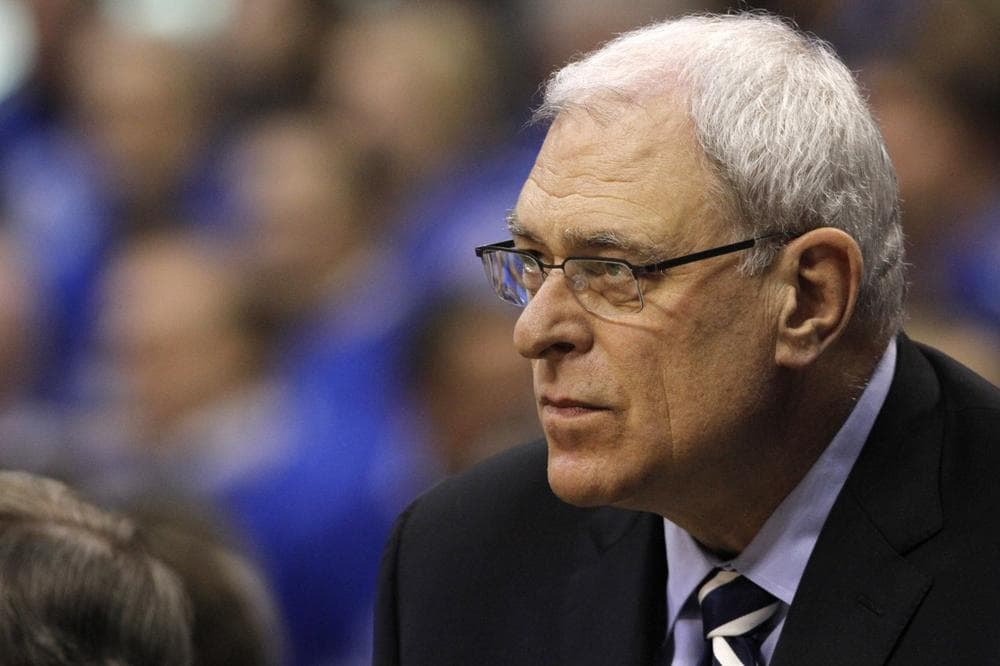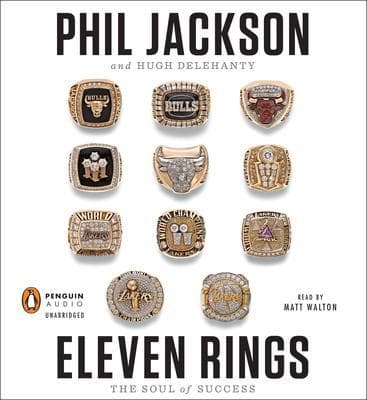Advertisement
Featured Book
Phil Jackson Reflects On His Historic NBA Career In 'Eleven Rings'

If you're an NBA fan, you probably know that Phil Jackson has won more championship rings than any other NBA coach. He's got eleven of them, which accounts for the title of his new book, Eleven Rings: The Soul of Success (see our review at the bottom of this page). Bill Littlefield spoke with Jackson on Only A Game.
BL: I found a line from the second chapter to be surprising. "My job as a coach was to make something meaningful out of one of the most mundane activities on the planet: playing pro basketball." When did you first think of pro basketball in those terms?
PJ: Oh, probably when I was probably about in my sixth or seventh year as an NBA pro. I played 14 years. I think halfway through it became somewhat of a routine: the downtime, the travel, the practices. And then as a coach, I just saw how players could lose interest could get distracted. Most of their days were open except for an hour and half or two of practice. The NBA’s changed that a lot, Bill. Practices are more fulfilling because of video work, [and] there’s weight work. That’s improved considerably. We didn’t even have shootarounds my first seven years of the NBA. There’s even game days you woke up in the morning and you’d wait, just wait, for those times you’d get to be on the court.
BL: When you were playing for the Knicks and later the Nets from the late '60s until 1980, were you already thinking about coaching?
PJ: You know, it was one of the last things on my mind that I was gonna do. I had no intention of doing it. I got to the Nets, I went there with Kevin Loughery, a former player with the Baltimore Bullets, encouraging me to come, saying, “We had a bad season, 17-18 wins last year. We want to do better. I need somebody that has some experience that can give me some help even as a coach, even as maybe a player/coach.” So I went. Our center, rookie center, came down with an ACL tear and I was activated and played like 78 games or something that year. A week into that tenure, Red Holtzman called me up from the New York Knicks. “I’ve just been named the coach. They fired Willis Reed. I’d like to have an assistant. Would you be interested?" I said, "I just started playing, Red, so I can’t take it.” But that was my introduction to the fact that, hey, other people see me as being more than just a player.
BL: Important elements of a successful basketball team include hustle, rebounding, and size up front. But you contend that "if a team doesn't have the most essential ingredient – love - none of those other factors matter." Is that how you put it to Michael Jordan and his teammates when you became the Bulls' coach in 1989?
PJ: I wouldn’t use the term "love." There’s another term, agape, you hear used a lot with charismatic religious groups, that it’s this more pure love of caring, of sharing of concern and understanding. I think players and teams have to come to that at some point in the season to become successful. Maybe not “personal friends,” but they become teammates at the highest level of that term.
BL: You recently told Time.com that if you had to choose between Michael Jordan and Kobe Bryant, you'd flip a coin, but that if you were building a team from scratch, you'd choose Bill Russell. Why Russell?
PJ: Eleven championship rings (chuckles). He personifies success as a player and his competitiveness, his defensive prowess, his teamwork capabilities... this is a guy that wasn’t a big scorer, but could score when it was needed for his team. He was constantly playing defense, not only with his body, but also with his head. He had a great influence on the game, and I think that’s where the credit lies.
BL: You've quoted Zen proverbs to your players. You've directed them to play basketball in the dark. You've required them to write book reports on books of your choosing. Can you give me a specific example of a time when a player has complained that that stuff is all nonsense?
PJ: Well, there’s been so many really, that players have LIKED. Steppenwolf was something that I gave to Shaq, and he gave me back a book report that was funny ... this funny, funny thing.
BL: I can’t even begin to Imagine Shaquille O’Neal’s book report on Steppenwolf.
PJ: Yeah ... But, you know, there have been a number of those books that have made a difference to players, and I value the fact that they understand more about me by the books I give them.
BL: You included various Indian proverbs in the book, and even a line from English poet Matthew Arnold. But you really got my attention with a line from Tom Waits, which goes, "The way you do anything is the way you do everything." Those words begin the chapter titled "A Question of Character." Tell me about that choice.
PJ: The real value in everything you do is in the details. I just like that quote. A very similar way to say the same thing. If you’re washing dishes you pay attention to washing dishes. If you’re driving a car, you’re paying attention to driving the car, you’re not eating a Big Mac or whatever. Those are the things that really show up this time of the year, when you’re getting into playoffs and you’re playing the fifth or sixth or seventh game against a team. You have to have some real basic things that are done, all that setup stuff that goes along with the details and execution, and how important that is to basketball.
BL: There is lots of discussion of meditation in the book. Did you ever find yourself meditating on why Shaquille O'Neal couldn't more often put the ball in the basket from the free throw line?
PJ: Well, there’s a thought process behind that. And it has to do a lot with standing in front of a massive group of people, whether its 18,000 or you’re thinking about the people on television that are also watching. And it distorts the simplest thing that you do, and that’s shooting a free throw. Shaquille had an issue. He had an injury issue in the wrist, where he couldn’t get that bend in the wrist that puts the ball back on the platform, and he had to have it extended, so it ended up like a shot put for him. We had to teach him to bend his knees yp get the elevation, and not make it flat, but he had tendinitis in his knees and that was uncomfortable and created a little sensation when he tried to bend his knees. [I said,] “Let’s try underhanded.” “No, I can’t do that.” Well, if you’re successful at it, people will not think of it as a Granny shot. They’ll think of it the way you solved that problem. But I know you had him in Boston, and he was loved there because of his great personality. But there’s a lot about Shaquille, he’s insecure and shy, and his insecurity showed at the line.
Advertisement
BL: Those who would minimize your achievements as a coach might say, "Sure, he won all those championships, but he had Michael Jordan and Scottie Pippen on the Bulls and Shaquille O'Neal and Kobe Bryant on the Lakers. What coach wouldn't have won?" Is there any validity to that contention?
PJ: Well, there is. There’s a lot to be said about that. In fact, I had maybe my most talented team, [the 2003-04 Lakers], we couldn’t win with, which had Karl Malone and Gary Payton to go along with Kobe Bryant and Shaquille. And we couldn’t win. We got to the Finals, which is success, but not the ultimate success. The best thing that I think happened to me was I got this opportunity to have really good players and we were able to meet the demand of the competition. And I think that’s what I value most.
BL: In Eleven Rings, you write that you went through a tough time in 1980, after you left the Nets because you missed playing. I don't know if you felt the same way about coaching after the 2011 season ended, but there has been speculation that you'd like to coach again. Would you be receptive to the right offer?
PJ: You know, I have no intention of coaching. I don’t think I could be thrilled enough to break that intention. I know the physical demands. I know what it takes to be a coach. I’ve gone through that. I think I came up short my last season. Lots of things were happening physically to me, and emotionally, perhaps mentally, too. I thought it was time to tend to more important things, like health and like family. I still enjoy that, and I don’t think I have any need to go back to coach.
BL: How is your health now? Are you ok?
PJ: Yes, I’m doing well. I went to radiation, a barrage of radiation [for prostate cancer] in late January, February and March. But it seems to be good now.
 Bill's Thought's on Eleven Rings
Bill's Thought's on Eleven Rings
Phil Jackson has won eleven NBA championships as a head coach. That's the top of the line.
And he has said and written that he likes to "invent rituals to infuse practices with a sense of the sacred."
Why haven't other NBA head coaches infused their practices with a sense of the sacred?
Phil Jackson does not take on that question in Eleven Rings: The Soul of Success. He does, however, discuss openly his "job as a coach," which is "to make something meaningful out of one of the most mundane activities on the planet: playing pro basketball."
Jackson's attempt to elevate his work above the "mundane" requires "mindfulness meditation," bits of wisdom he collects from sources as diverse as the Buddha and Tom Waits, and the cultivation among his players of what he refers to as "a great love for one another."
There is also a lot of basketball in Eleven Rings. Jackson writes about how he helped both the Chicago Bulls and the Los Angeles Lakers to achieve higher consciousness. Each team had to evolve from being an unconnected collection of superbly gifted but self-centered players into a cohesive unit, the elements of which were bound together by love and characterized by balance in mind, body, and spirit.
You want something more specific? Fair enough. In the chapter titled "The Wisdom of Anger," Jackson writes that "coaching the Lakers was like having a wild, tempestuous fling with a beautiful woman."
Yikes.
This segment aired on June 1, 2013.
